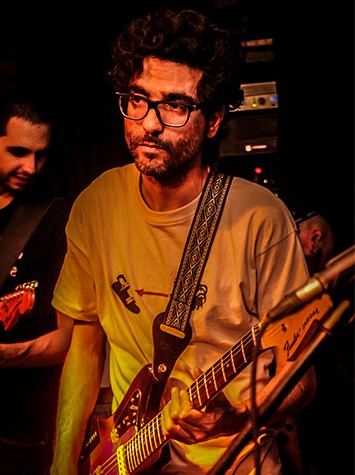These Palestinian lads are definitely onto something. They’re not your average clean-cut band. Their tunes are not carefully tailored mixtures of oriental and rock genres. They are fresh, loud and accidental. They’ve taken all their influences since childhood and mashed them together. The result is a medley that includes everything from Palestinian folklore to punk rock. Before their show in Cairo Jazz Club, Jowan Safadi, Tamer Omari, Bshara Rizq and Eissa ‘Jebus’ Khoury were nice enough to talk music to us.
Your music is very interesting. How did this merger of traditional and rock music come along?
Jowan: I’ve been making music like this for a while, but it changed according to the people who joined me. I was joined by like-minded people. Each one of them came from a different world and brought a part of it with him. I write most of the songs along. Then we twist and play around with it and make it into something else.
Which people are more receptive to your music?
Jowan: We come from a place where the scene isn’t that divided. It’s all combined under the title “alternative music”. They like the music not because of the genre, but because it’s different.
Tamer: I’ve been playing with Jowan for a while. The subjects he addresses are ones that everyone talks about, only they do it in secret. This is the first time I see someone speaking about these topics publicly. He was even imprisoned because of his lyrics. So it’s new and edgy.
Speaking of imprisonment, do you mind telling us what exactly happened?
Jowan: Officially, I was never told the real reason. Some claim it was to protect me from religious extremists. And some say they did it to show off to the Islamists. They put the infidel away! Like, “we’re protecting religion so you don’t have to do it yourself”.
How does it feel like to be imprisoned because of your music?
Jowan: This isn’t the first time. It’s the first time that it’s done so bluntly, but I’ve been investigated with and threatened before. It’s okay, though. You get used to that sort of thing.
What do you think of the independent music scene in the Middle East?
Bshara: It’s becoming freer and more experimental. There’s good competition, also, and it is amazing ground for things to grow.
Tamer: Back home there are some amazing bands. The problem is that they lack the proper PR. So they’re not as well-known as they should be. Fortunately, we have Youtube and Facebook these days.
Does coming from a country that is going through political turmoil help musicians become more creative or curb their talent?
Jowan: Any troubled environment will create some kind of inspiration. On the other hand, the fact that it’s a troubled environment will be an obstacle. So it makes you more creative and it binds your creativity at the same time.
How difficult it is to perform in Palestine?
Jowan: We perform wherever it’s possible. We innovate new ways to perform. We have to get our own stage, equipment and venue. We create our own scene, and it’s all underground.
Egypt has been going through its own version of political turmoil. Do you have any advice for Egyptian musicians on how to deal with that?
Jowan: First of all, don’t preach. Secondly, don’t get involved in politics and start expressing it until you understand what you’re talking about. It’s really complicated. Talk about girls or philosophical issues all you want, but when you’re involving other people’s minds, you need to be sure of what you say.
When did you realize you wanted to be a musician?
Jowan: I always knew I had something to do with art. I started with drawing – I even drew the cover of my very first album. Then, I did poetry. Only at a later age – at around 21 – I took my first guitar. I did it just to write music for the poems I wrote. And that’s how it started.
Bshara: I started playing the violin when I was six years old. When you grow up in a free home, you feel like you have something to say. And you always look for ways to say it. At the age of 16 I heard some guitar tracks and I said, “this is what I want to do”.
Tamer: I started at around seven years old with the keyboard and percussions. Then I decided on the bass when I was 17 or 18.
Jebus: I was born like this. (laughs)
When will you feel like you’ve “made it”?
Jowan: That term has already been defined by the mainstream music industry. It’s “The dream” that was implanted in our heads for years. For the first few years, it was the vision in my mind. Later, however, I knew that’s not what I really want. Honestly, I find it very hard to deal with attention. I appreciate it, but I can’t stand too much of it.
Tamer: We do love playing, though. And when people invite us from Cairo to play, it’s such a great thing for us.
Bshara: I think that it’s when you’re in a concert and you feel like you can leave the microphone for the audience, and they’ll finish the song.
What inspires you?
Jowan: First, it’s feelings. When you feel, it’s not intentional. Without even trying to do anything, it just comes out. The other thing is information, a sparkling piece of information. This will create a completely different kind of music. It wouldn’t be emotional; it would be very conscious. This kind of song speaks to your mind rather than speak to your heart.
Bshara: Good art inspires me. If I listen to a really nice track or see a beautiful painting, I immediately do something.

